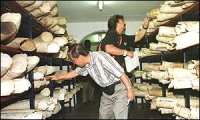Chinese-run smuggling rings are responsible for illegal ivory imports
Chinese-run smuggling rings based in Africa are responsible for illegal ivory imports nearly doubling in the past decade.

The Cambridge-based wildlife trade monitoring watchdog Traffic International appealed to the Chinese government to help control the problem.
"It is imperative that China reaches out to the growing Chinese communities in Africa with a clear message that involvement in illegal ivory trade will not be tolerated," said Tom Milliken, director of Traffic's Africa program.
Worldwide, there are an average of 92 ivory seizures a month or three per day, the report said. Thirty-two seizures of 1 metric ton (1.1 U.S. tons) or more of ivory were recorded between 1998 and 2006, up from 17 between 1989 and 1997, according to an analysis by the watchdog of international elephant product seizure records.
Markets in China are driving the demand for illicit ivory, which arrives either directly or through ports in Hong Kong, Macao and Taiwan. Japan and Thailand are also important final destinations, and the Philippines is a key transit country.
These seven countries and territories account for 62 percent of the ivory recovered in the 49 largest recorded seizure cases, the report said.
The study identified the Democratic Republic of the Congo, Cameroon and Nigeria major sources of illegal ivory.
"With myriad conflict zones, Central Africa is currently hemorrhaging ivory, and these three countries are major conduits for trafficking illicit ivory from the region to international markets, particularly in Asia," Milliken said.
Ivory trading threatens elephant populations by creating commercial incentives for poachers. The ivory is used mostly to make decorations or luxury items.
"This demonstrates greater sophistication, organization and finance behind the illegal movement of ever larger volumes of ivory from Africa to Asia," said Susan Lieberman, director of the World Wildlife Fund's Global Species Program. "This is clearly a negative consequence of the ongoing globalization of African markets and economies."
Traffic International monitors trade in endangered animals across Europe for the CITES Secretariat in Geneva, Switzerland.
Subscribe to Pravda.Ru Telegram channel, Facebook, RSS!




